Elections, Voting and What Year Is It?
What am I to make of these mid-term elections… The massive voter registration and suppression issues… Going on right now, in 2018? The parallels and similarities begin to all run together and it feels like I’m teeter-tottering between 1965 and present day; dazed and a bit confused sometimes. Thus this blog post: Elections, Voting and What Year is This? When I hear of everything that’s taking place all over the country; the blatant lies being passed from the top down in our government; and I won’t even get into the repeatedly spewed vitriol that’s beyond disrespect. Welcome to the 2018 Midterm Elections! Which by the way is just one example of unprecedented, divisive and unethical government activity taking place since January 20, 2017, but I’ll leave that alone for now. I wrote about some of that activity in this blog pose here.

Let’s start with some history…
Elections have been the epicenter of democracy here in the United States of America since its inception. As written in the Constitution, voting was always the right of every American citizen. But it was not a right for people of color who white Americans in power regarded and labeled 2nd class citizens. Because of the Civil War’s North victory, the 13th Amendment abolished slavery, and the 14th Amendment to the Constitution in 1868 deemed that all African-American people be granted the full rights of citizenship and “equal protection under the law.” In 1870, the 15th Amendment made it illegal for the federal government and all states to deny a citizen’s right to vote based on their “race, color, or previous condition of servitude” giving Black men the right to vote. Unfortunately, despite these constitutional amendments, Black men still were not allowed to exercise their right. If they weren’t plain run off, they would be viciously deterred on every front. Then there were the poll taxes (more about those in a moment), literacy tests, all sorts of fraudulent rules, including the “grandfather clause” that stated “if your grandfather didn’t vote, neither could you”; their ballots destroyed, sometimes right in front of them, or the lot of their ballots thrown out with the trash at the end of the day. That’s IF they were even allowed to actually cast that vote.
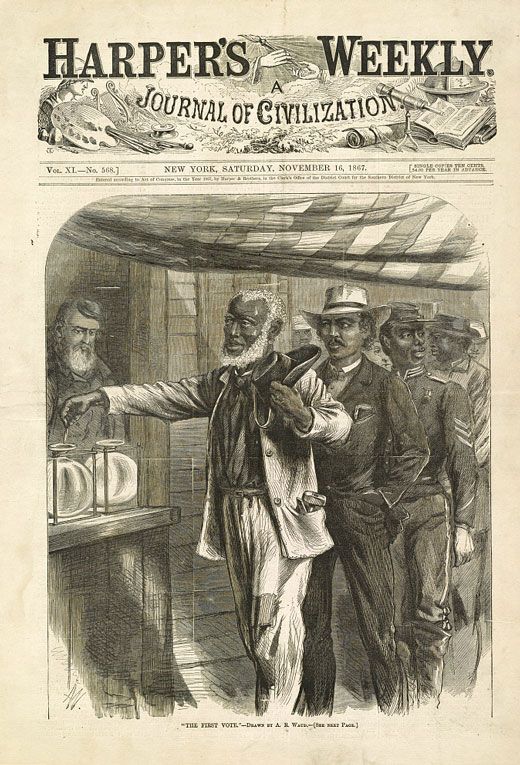
Footnote: Please keep in mind that Democratic and Republican political parties of that time were switched from what they are today. The party that was supportive of lifting the voting constraints of people of color were Republicans, primarily leaders in the North who were for the end of slavery, and the party that stood opposed to that progress and evolution were Democrats. Slaves typically and understandably claimed the Republican party back in the day because of their values, policy and stand at the time. Somewhere between 1868 and 1936, the parties completely switched platforms, beliefs and opinions. This is important to remember when you hear criticism of Representative Elijah Cummings for saying Democrats were responsible for getting the Civil Rights Act passed, because that happened later, after the switch. Moving on…
In the battle to secure voting rights for all, Representative John Lewis, then chairman of the Student Nonviolent Coordinating Committee (SNCC), was one of those beaten and bloodied along with several thousand people who marched in Selma, Alabama on what’s historically known as “Bloody Sunday”, March 7, 1965, in protest of the violation of civil rights, particularly voting rights.
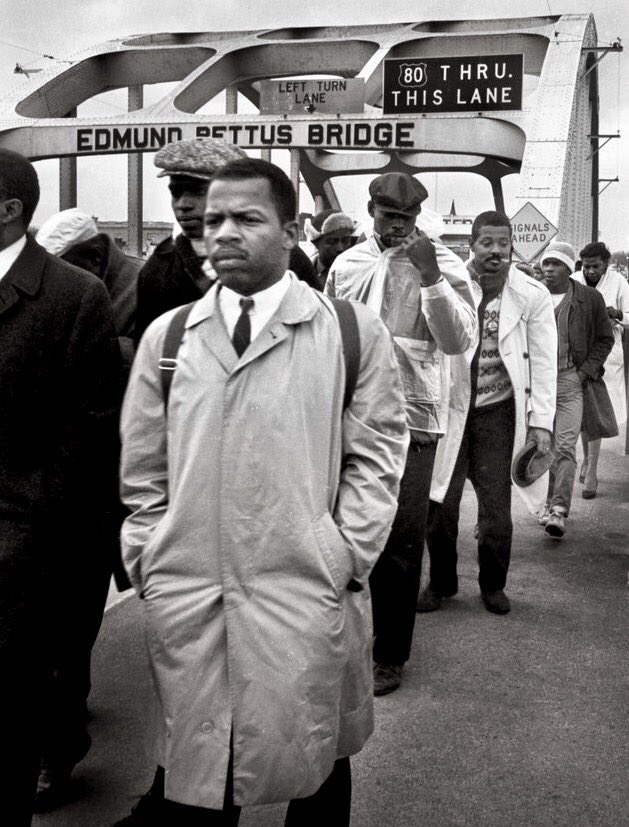
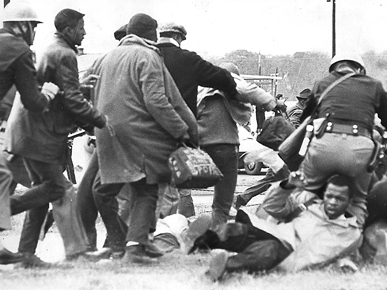
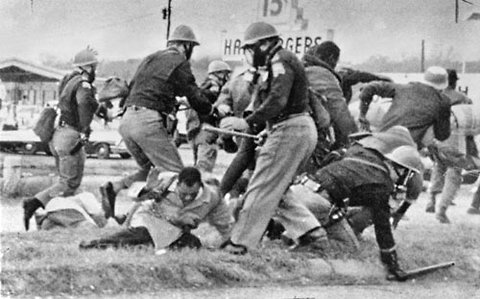
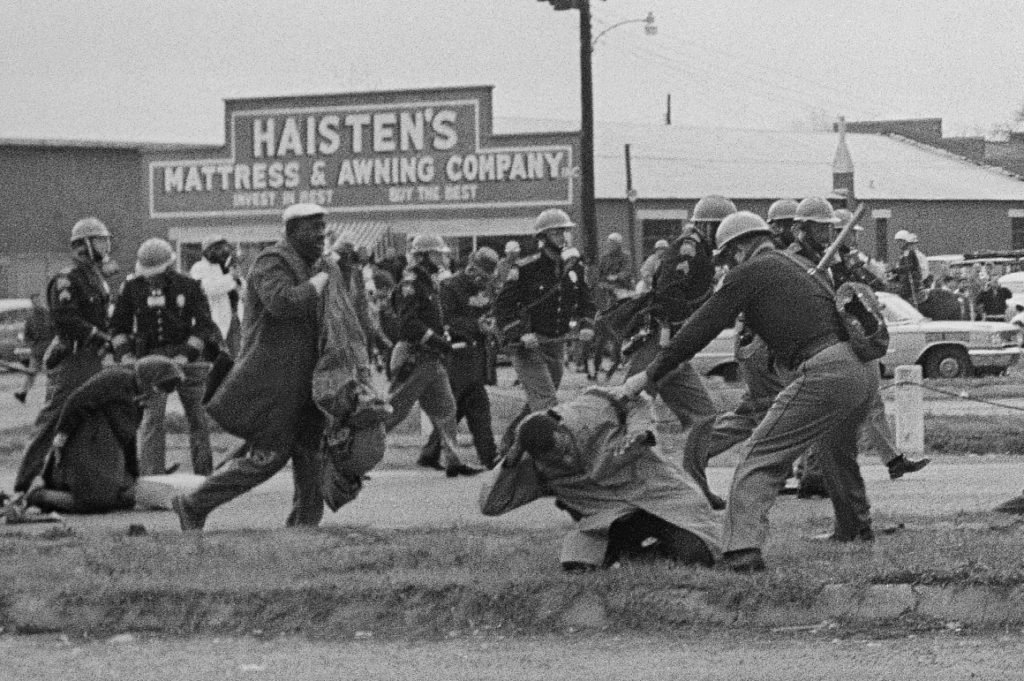
The Voting Rights Act of 1965…
Although the 15th Amendment was passed in 1870, it would be a 50 year continuance of the fight. Voting was still a virtual impossibility for Black Americans through the decades that continued to 1964, where through the efforts of Dr. Martin Luther King, Jr. along with thousands of relentless supporters and protesters, the 24th amendment was passed prohibiting the poll tax. The poll tax was a fixed tax that everyone had to pay, and was a prerequisite for being able to cast your vote; implemented by some states as a device to restrict the votes of Black men. You can read more about the history of poll taxes here. Then on August 6, 1965, The Voting Rights Act was signed into law by President Lyndon B. Johnson, making it illegal for any and all states to deny voting rights to people based on race, and eliminated the discriminatory literacy tests that had previously been used, providing Federal protection against local government actions that would try to operate contrary to the Federal law.
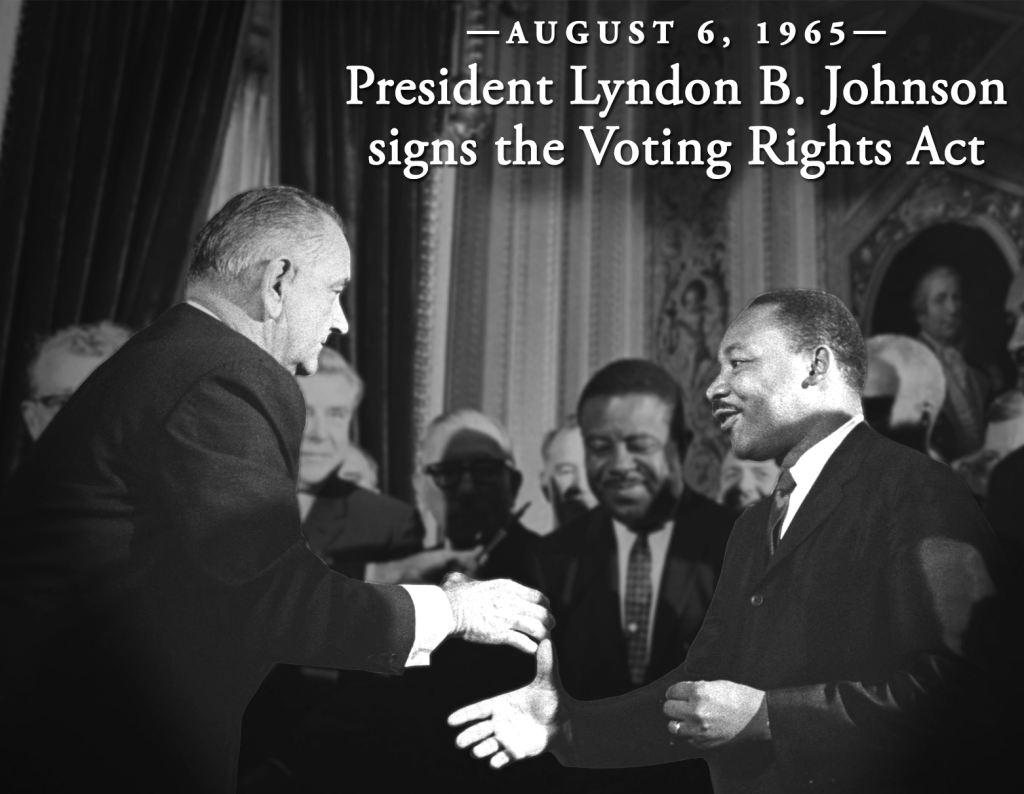
While this was one of the biggest civil rights milestones of our time, it was by no means a slam dunk or a done deal. There were special provisions built into the Voting Rights Act with set expiration dates in 1970, and because of such, the Act had to be amended in 1970, 1975, 1982, 1992 and 2006. Why those “special provisions” were never simply made into law by way of another constitutional amendment as well, is beyond my comprehension. Below, President George W. Bush is pictured signing the 2006 amendment to the Voting Rights Act of 1965.
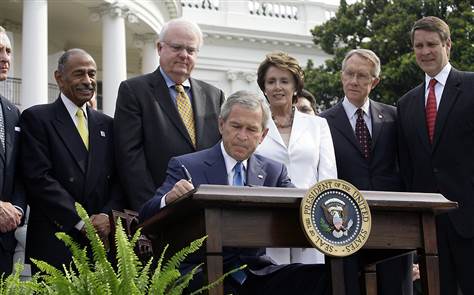
John Lewis, now a U.S. Representative, has been fighting for the restoration of theVoting Rights Act since the 2013 Supreme Court Ruling came down.
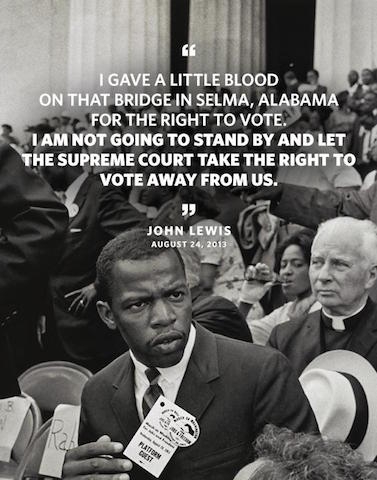
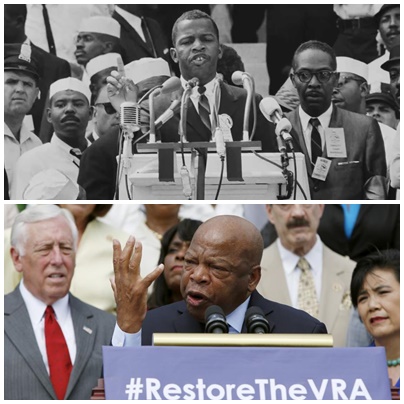
This is why John Lewis is still fighting…
One of the most significant setbacks to the VRA, was in a 6-3 Supreme Court decision in 1980, that sided with Mobile, Alabama, placing the burden of proof of election discrimination on the plaintiff. Without it, in their view, there is no violation of the 15th Amendment. This was in response to the case won in the lower courts back in 1925, claiming the election process and districting issues were discriminately set. Thurgood Marshall, the first African-American Supreme Court justice, drafted a furious dissent, stating: “A plurality of the Court concludes that, in the absence of proof of intentional discrimination by the State, the right to vote provides the politically powerless with nothing more than the right to cast meaningless ballots.” All those fighting for civil rights know the difficulty and almost impossibility of proving this kind of systemic discrimination. And in 2013, in the landmark Supreme Court case, Shelby County vs. Holder, Chief Justice John Roberts authored the majority opinion that substantially reversed major portions of The Voting Rights Acts, namely the provisions requiring states and local governments to obtain Federal permission to alter the Act, citing that with out-dated, 40-year-old data, state and local government preclearances would no longer be necessary. What we are experiencing today would highly suggest otherwise.
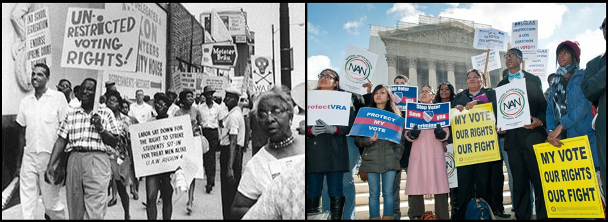
The fight continues…
Since the ruling in 2013, over a thousand polls in predominantly Black counties have been closed. Fewer voting locations equals lower voter turnout, research has proven. Many states once restricted by the pre-clearance legality, have since removed provisions like online voting registration, early voting, “Souls to the Polls” Sunday voting, same-day voter registration, pre-registration for teens soon to be 18, and the implementation of provocatively excessive voter registration and identification laws. All mostly affecting minorities, all implemented by Republicans.
If you’ve been following the reporting of this year’s midterm elections, you’ve heard of wide spread voter suppression in North Dakota, in Dodge City, Kansas, and Florida among other states. Students of the HBCU Prarieview A&M, in Prarieview, Texas have been fighting a voting rights battle for decades. I remember voting for the very first time while I was in college, and the process was easy peasy; no drama, thank God. I can’t imagine being in school trying to keep up with your studies (people bled, died and sacrificed for us to pursue higher education too), and then having to march and protest and stay on top of politicians who are trying to prevent you from casting your vote. And then there’s Georgia, where the current Secretary of State, Brian Kemp, notorious for voter suppression, refuses to step down from overseeing the Governor’s election in which he is a candidate. How do you supervise an election that you’re a candidate in? That’s like referring yourself in a Basketball game!
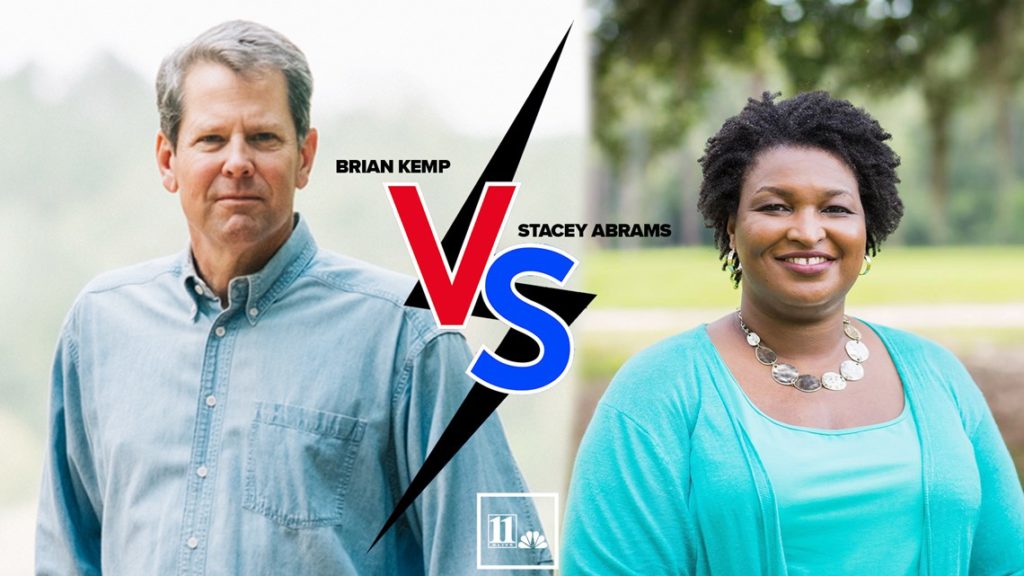
With many of the midterm races still up in the air, who knows how it will all turn out. With the cards seeming stacked against many of us, it feels like we don’t have a vote or our vote is tainted or discarded in some way so that it won’t count. So what do we have left? In the current political climate, with a non-accountable, corrupt-as-can-be-with-no-consequence administration, and voter suppression mirroring the likes of the same some 40-50 years ago, it may seem maddening, utterly depressing, and completely hopeless. If you’re like me, watching The Rachel Maddow Show on MSNBC to see the latest degredation of democracy, has become a staple of the day. For the first time in my adult life I’ve thought, “Dear God, this is bad!” But for as bad as it is, I must hold onto hope. I must hold onto my faith and know that ultimately God is on my side; he’ll never leave me nor forsake me. Without my faith I would absolutely feel hopelessness and dread. And I encourage everyone to hold onto your hope, hold onto your faith, no matter what. Don’t worry about all of the lies, dirt and dispicable acts taking place. Hold onto “one day”… Just remember: what goes around comes around, and this too shall pass. God bless :)xo


In the Fall of 1984, at the start of my sophomore year at Morehouse College, I joined the debate team and the evening before our departure for our first debate at the University of Mississippi happened to be the night of the funeral of the Reverend Dr. Martin Luther King Sr. at the chapel named for his son.
Instead of attending we on the debate team were in the midst of final preparations in the form of practice debates at an academic building diagonally across the street and during breaks I clearly remember stepping out onto the second floor balcony and seeing the searchlights bathing the chapel and being nearly overwhelmed by the magnitude of the fact that the son of the man then being funeralized was immortalized in a twenty foot tall bronze statue just outside the King Chapel’s front door.
I thought of all the history of struggle & sacrifice encapsulated in that moment & how much we the beneficiaries of the efforts of the Kings & the millions who struggled & sacrificed with them, owed them and how our failure to fully exercise those rights they got for us, chiefly the right to vote, constituted an unconscionable betrayal of them.
So with that in mind I have never failed to vote in any single election I have known about & been eligible to vote in since I became eligible to vote upon turning 18 years old in the late Spring of 1983. It is my opinion that voting is the bare minimum we can do for those who bequeathed to us so much and that it is the least we can do for those yet unborn who may lose the right to vote if we ourselves fail to exercise that right to its maximum effect.
For people in general and we people of color in particular there is never any excuse whatsoever not to vote if we have the opportunity to do so; none. The idea that there is nothing or someone to vote for is pure nonsense because there is always someone and some thing to vote against. There is always a greater evil that our one vote can help to prevent and that by itself is more than enough reason to always cast a ballot; to make your voice heard.
All of us are to an extent minimized & marginalized by the magnitude of our time but the power of the ballot is the great equalizer; the one thing that makes us as powerful as the most powerful people on Earth and that is why the powerful work so hard to take that power away in the form of voter suppression.
Yet these efforts on the part of the powerful are doomed to failure unless we ourselves fail to exercise the power of the vote whenever we have the chance and as such we cannot lose this right, we cannot be conquered, without our consent; that consent being the form of willingly refusing to use the elective franchise to make better the life of this nation and the lives of all people here and all over the world.
Well said, and agreed Eric! Thank you so much for sharing 🙂
Ingrid